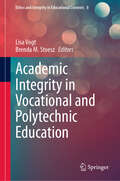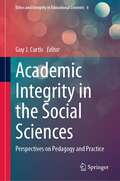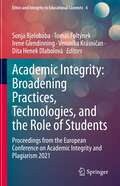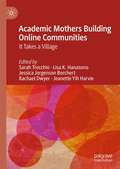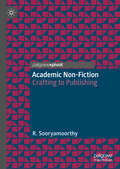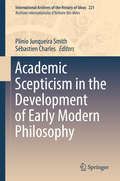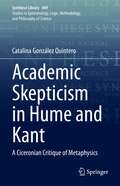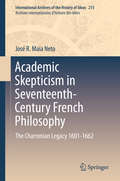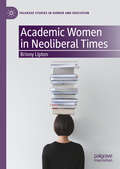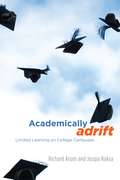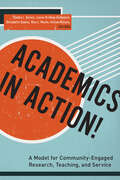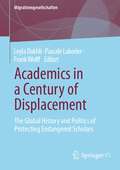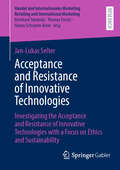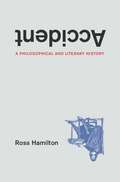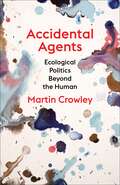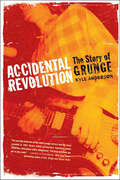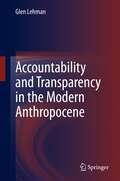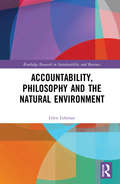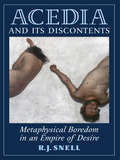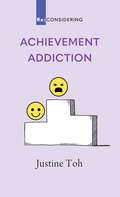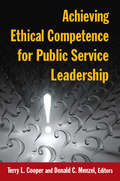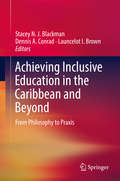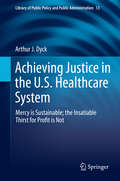- Table View
- List View
Academic Integrity in Vocational and Polytechnic Education (Ethics and Integrity in Educational Contexts #8)
by Brenda M. Stoesz Lisa VogtAcademic Integrity in Vocational and Polytechnic Education addresses educative approaches to support academic integrity in hands-on and applied learning environments with a focus on practitioner experiences. Building on systems theory, the book documents multi-stakeholder perspectives of institutional leaders, department specialists, and individual champions of academic integrity. Readers will be introduced to the 4M framework, which views academic integrity as a responsibility at all levels of the institution and connects to the broader community and professional industries. Each chapter is set in an applied context and lends to the philosophy of a shared responsibility in growing the institutional culture of academic integrity. This book offers insights from the perspectives of leaders, faculty, and support staff, as authors describe challenges and solutions to upholding academic integrity in short term programming geared toward employment readiness. Although the work is about vocational and polytechnic education written by members of this community, it has a wider appeal across higher education due to shifting pedagogical methods that are becoming more applied and personalized. In an age of information ubiquity, where traditional learning activities such as rote memorization and essay writing do not sufficiently assess learning or prepare the learner for the workplace, educators will find unique insights from the vocational and polytechnic sector to supporting academic integrity in a changing academic landscape.
Academic Integrity in the Social Sciences: Perspectives on Pedagogy and Practice (Ethics and Integrity in Educational Contexts #6)
by Guy J. CurtisThis international book provides a series of viewpoints on academic integrity from the perspective of social sciences. It brings together multiple aspects of academic integrity, but with the consistent theme of being at a level of analysis that considers people and their place in the world. It covers topics such as how academic integrity can be taught, and why academic integrity breaches occur. This book informs the work of researchers, educators, and practitioners as we go forward in understanding academic integrity and addressing academic misconduct. The social sciences include academic disciplines such as sociology, economics, psychology, education, anthropology, political science, and criminology. Researchers and theorists in these fields offer a range of unique and valuable perspectives on academic integrity with questions ranging from: “Why do students cheat and how best do we teach them not to?” to “What are the societal and political implications of academic cheating?”
Academic Integrity: Proceedings from the European Conference on Academic Integrity and Plagiarism 2021 (Ethics and Integrity in Educational Contexts #4)
by Sonja Bjelobaba Tomáš Foltýnek Irene Glendinning Veronika Krásničan Dita Henek DlabolováThis book aims to broaden the horizons of academic integrity by discussing novel practices and technologies, and the importance of student involvement in building a culture of academic integrity. Examples are the outreach efforts towards a range of non-educational organisations, the exploration and comparison of ethical policies and actions in different institutions, and the improvement of student responses in research on sensitive topics. It explores a range of scenarios and strategies adopted in different parts of the world during the COVID-19 pandemic, and addresses new technological advances for investigating types of academic misconduct that are difficult to find, including translation plagiarism, contract cheating, the usage of the proctoring systems, and the innovative use of data mining to detect cheating on on-line quizzes. The work shows how working with students is an essential part of the fight against academic misconduct. The student voice can be a powerful source of motivation for students, but educators also need to understand their perspectives, especially regarding such an important topic as academic integrity.
Academic Mothers Building Online Communities: It Takes a Village
by Rachael Dwyer Sarah Trocchio Lisa K. Hanasono Jessica Jorgenson Borchert Jeanette Yih HarvieThis volume focuses on the diverse ways in which mothers working within academia seek to find others with similar experiences to build virtual communities. Although the faculty and student populations of universities have diversified, mothers in academia are disproportionately overrepresented in precarious faculty and staff positions and continue to experience myriad institutional and interpersonal barriers, such as gender wage gaps that are exacerbated by stop-the-clock tenure policies, inadequate parental leave policies, expensive or scarce local childcare options, and social biases. The book gives space to the many ways women create and challenge their own versions of motherhood through a digital “village,” examining how academic mothers use virtual communities to seek and enact different kinds of support.
Academic Non-Fiction: Crafting to Publishing
by R. SooryamoorthyThis book offers comprehensive directions to crafting academic nonfiction that is both rigorous and captivating, filling a critical gap in the genre. While academic nonfiction plays a vital role in fostering knowledge-based societies and driving economic growth, there has long been a need for a resource that helps authors create works that are as engaging as they are informative. Designed for both aspiring and established writers, this book provides practical advice and innovative techniques to elevate nonfiction writing. It covers everything from selecting marketable topics and developing effective writing habits to managing time and navigating the complexities of the publication process. Unlike most writing guides, it emphasises how to infuse nonfiction with the allure and engagement necessary to reach a broad audience without compromising accuracy or depth. With short, digestible chapters, insider tips on proposal writing, and insights into the peer review process, this book serves as a step-by-step roadmap to transforming academic writing into compelling works. Essential for writers aiming to produce nonfiction that not only informs but also resonates with readers, this resource is an indispensable tool for creating impactful scholarly work.
Academic Scepticism in the Development of Early Modern Philosophy (International Archives of the History of Ideas Archives internationales d'histoire des idées #221)
by Sébastien Charles Plínio Junqueira SmithThis book explores how far some leading philosophers, from Montaigne to Hume, used Academic Scepticism to build their own brand of scepticism or took it as its main sceptical target. The book offers a detailed view of the main modern key figures, including Sanches, Charron, La Mothe Le Vayer, Bacon, Gassendi, Descartes, Malebranche, Pascal, Foucher, Huet, and Bayle. In addition, it provides a comprehensive assessment of the role of Academic Scepticism in Early Modern philosophy and a complete survey of the period. As a whole, the book offers a basis for a new, balanced assessment of the role played by scepticism in both its forms. Since Richard Popkin's works, there has been considerable interest in the role played by Pyrrhonian Scepticism in Early Modern Philosophy. Comparatively, Academic Scepticism was much neglected by scholars, despite some scattered important contributions. Furthermore, a general assessment of the presence of Academic Scepticism in Early Modern Philosophy is lacking. This book fills the void.
Academic Skepticism in Hume and Kant: A Ciceronian Critique of Metaphysics (Synthese Library #449)
by Catalina González QuinteroThis book offers an unprecedented study of the influence of the skepticism of the New Platonic Academy on David Hume’s and Immanuel Kant’s critiques of metaphysics. By demonstrating how the skeptical teachings of the Academy affected these authors’ Enlightened attacks on traditional metaphysics, this book deepens and broadens the burgeoning scholarship on the role that the Ancients schools of skepticism played in the configuration of Modern skeptical outlooks. It bolsters the newfound recognition that we must reconsider the conventional view that the revival of Pyrrhonism in the sixteenth and seventeenth centuries gave birth to Modern skepticism by incorporating the influence of Academic skepticism in the analysis.Giving a new impetus to this line of research, the author argues that Academic ideas and methods informed Hume’s and Kant’s critique of metaphysics in substantial and thus far unacknowledged ways. Specifically, she demonstrates the centrality of Academic skepticism to Hume’s epistemology and critique of religion through a detailed analysis of his theory of belief in the Treatise and the first Enquiry as well as of its application in the Dialogues concerning Natural Religion. Likewise, her analysis reveals how Kant’s anti-metaphysical stance, developed in the Transcendental Dialectic of the Critique of Pure Reason, contains many skeptical insights of Academic inspiration, bequeathed to him by Hume.
Academic Skepticism in Seventeenth-Century French Philosophy: The Charronian Legacy 1601-1662 (International Archives of the History of Ideas Archives internationales d'histoire des idées #215)
by José R. Maia NetoThis book is the first systematic account of Pierre Charron's influence among the major French philosophers in the period (1601-1662). It shows that Charron's Wisdom was one of the main sources of inspiration of Pierre Gassendi's first published book, the Exercitationes adversus aristoteleos. It sheds new light on La Mothe Le Vayer, who is usually viewed as a major free thinker. By showing that he was a follower of Charron, La Mothe emerges neither as a skeptical apologist nor as a disguised libertine, as combatting superstition but not as irreligious. The book shows the close presence of Charron in the preambles of Descartes' philosophy and that the cogito is mainly based on the moral Academic self-assurance of Charron's wise man. This interpretation reverses the standard view of Descartes' relation to skepticism. Once this skepticism is recognized to be Charron's Academic one, it is seen not as the target but as the source of the cogito. Pascal is the last major philosopher for whom Charron's wisdom is crucially relevant. Montaigne and Descartes influenced, respectively, Pascal's view of the Pyrrhonian skeptic and of the skeptical main arguments. The book shows that Charron's Academic skeptical wise man is one of the main targets of his projected apology for Christianity, since he considered him as a threat and counter-example of the kind of Christian view of human beings he believed. By restoring the historical philosophical relevance of Charron in early modern philosophy and arguing for the relevance of Academic skepticism in the period, this book opens a new research program to early modern scholars and will be valuable for those interested in the history of philosophy, French literature and religion.
Academic Women in Neoliberal Times (Palgrave Studies in Gender and Education)
by Briony LiptonThis book investigates the gendered dimensions of academic life in the contemporary Australian university. It examines key discourses – most notably academic performativity and identity – through a feminist lens, and scrutinises how discourses of neoliberalism and feminism are entangled in the structure, systems, operations and cultures of the university. Drawing on in-depth qualitative interviews with academic women in Australia, the author uses a mix of experimental methods to emphasise the performative and discursive decisions women make with regard to their academic careers. In doing so, this book reveals how women themselves generate neoliberal and feminist shifts, how they manage the contradictions they produce, and how they carve spaces of influence and authority. Moving towards a re-evaluation of existing discourses, this book offers new insights into gender inequality in the Australian university in neoliberal times.
Academically Adrift: Limited Learning on College Campuses
by Richard Arum Josipa RoksaIn spite of soaring tuition costs, more and more students go to college every year. A bachelor's degree is now required for entry into a growing number of professions. And some parents begin planning for the expense of sending their kids to college when they're born. Almost everyone strives to go, but almost no one asks the fundamental question posed by Academically Adrift: are undergraduates really learning anything once they get there? For a large proportion of students, Richard Arum and Josipa Roksa's answer to that question is a definitive no. Their extensive research draws on survey responses, transcript data, and, for the first time, the state-of-the-art Collegiate Learning Assessment, a standardized test administered to students in their first semester and then again at the end of their second year. According to their analysis of more than 2,300 undergraduates at twenty-four institutions, 45 percent of these students demonstrate no significant improvement in a range of skills--including critical thinking, complex reasoning, and writing--during their first two years of college. As troubling as their findings are, Arum and Roksa argue that for many faculty and administrators they will come as no surprise--instead, they are the expected result of a student body distracted by socializing or working and an institutional culture that puts undergraduate learning close to the bottom of the priority list. Academically Adrift holds sobering lessons for students, faculty, administrators, policy makers, and parents--all of whom are implicated in promoting or at least ignoring contemporary campus culture. Higher education faces crises on a number of fronts, but Arum and Roksa's report that colleges are failing at their most basic mission will demand the attention of us all.
Academics in Action!: A Model for Community-Engaged Research, Teaching, and Service
by Lauren Brinkley-Rubinstein Bernadette Doykos Nina C. Martin Allison McGuireThe academy is often described as an ivory tower, isolated from the community surrounding it. Presenting the theory, vision, and implementation of a socially engaged program for the Department of Human and Organizational Development (HOD) in Peabody’s College of Education and Human Development at Vanderbilt University, Academics in Action! describes a more integrated model wherein students and faculty work with communities, learn from them, and bring to bear findings from theory and research to generate solutions to community problems.Offering examples of community-engaged theory, scholarship, teaching, and action, Academics in Action! describes the nuanced structures that foster and support their development within a research university. Theory and action span multiple ecological levels from individuals and small groups to organizations and social structures. The communities of engagement range from local neighborhoods and schools to arenas of national policy and international development.Reflecting the unique perspectives of research faculty, practitioners, and graduate students, Academics in Action! documents a specific philosophy of education that fosters and supports engagement; the potentially transformative nature of academic work for students, faculty, and the broader society; and some of the implications and challenges of action-oriented efforts in light of dynamics such as income inequality, racism, and global capitalism. This edited volume chronicles teaching, research, and community action that influences both inside and outside the classroom as well as presents dimensions of a participatory model that set such efforts into action.
Academics in a Century of Displacement: The Global History and Politics of Protecting Endangered Scholars (Migrationsgesellschaften)
by Frank Wolff Leyla Dakhli Pascale Laborier‘Endangered scholars’ is a recently highly relevant, yet historical notion. Embedded in the greater history of the 20th and 21st centuries, it captures the phenomenon of scholars who, after years of intellectual work and integration in their societies of origin, are forced to seek rescue in foreign host societies. The pressing urgency of the topic thus has an important historical background. From escaping Russian intellectuals after 1917 to the protection of Jewish refugees during World War II, Algerian intellectuals in contemporary history, or persecuted academics from Turkey today: Over the course of about a century, categories of inclusion, transnational relations, and forms of agency of scholars at risk remained surprisingly stable (and hence diachronously and synchronously comparable) while they also adjusted flexibly to contemporary conditions. This collective volume carves out this historical development and its recent expressions. It brings together researchers in a vivid yet largely unconnected field of migration and refugee studies. By developing a complex image of the origin of the global history and politics of protecting endangered scholars from the early 20th century until today, the book contributes to research on academics in exile as a part of refugee research, migration studies, the history of higher education, and the contemporary history of societies. The interdisciplinary volume explores the phenomenon as a historical, political and legal subject, brings together scholars of forced migration and intellectual studies, and includes currently affected scholars into those reflections.
Acceptance and Resistance of Innovative Technologies: Investigating the Acceptance and Resistance of Innovative Technologies with a Focus on Ethics and Sustainability (Handel und Internationales Marketing Retailing and International Marketing)
by Jan-Lukas SelterThe book examines the adoption of different innovative technologies and explores the behavioral intention of both consumers and companies of using these technologies. Both determinants of acceptance and resistance of technology are considered by referring to the Unified Theory of Acceptance and Use of Technology and the Innovation Resistance Theory. The six essays in this publication relate to six innovative technologies and approaches. This entails an examination of technologies that either involve ethical challenges or are designed with the objective of achieving (ecological) sustainability.
Accident: A Philosophical and Literary History
by Ross HamiltonFrom ancient philosophy to Tristram Shandy and Buster Keaton movies, this book tells the engaging history of accident as an idea. An accidental glance at a newspaper notice causes Rousseau to collapse under the force of a vision. A car accidentally hits Giacometti, and he experiences an epiphany. Darwin introduces accident to the basic process of life, and Freud looks to accident as the expression of unconscious desire. Accident, Ross Hamilton claims, is the force that makes us modern. Tracing the story of accident from Aristotle to Buster Keaton and beyond, Hamilton’s daring book revives the tradition of the grand history of ideas. Accident tells an original history of Western thought from the perspective of Aristotle’s remarkably durable categories of accident and substance. Throughout antiquity and the Middle Ages, Aristotle’s distinction underwrote an insistence on order and subordination of the inessential. In a groundbreaking innovation, Hamilton argues that after the Reformation, the concept of accident began to change places with that of substance: accident became a life-transforming event and effectively a person’s essence. For moderns, it is the accidental, seemingly trivial moments of consciousness that, like Wordsworth’s “spots of time,” create constellations of meaning in our lives. Touching on a broad array of images and texts—Augustine, Dante, the frescoes of Raphael, Descartes, Jane Austen, the work of the surrealists, and twentieth-century cinema—Hamilton provides a new way to map the mutations of personal identity and subjectivity.
Accident: A Philosophical and Literary History
by Ross HamiltonFrom ancient philosophy to Tristram Shandy and Buster Keaton movies, this book tells the engaging history of accident as an idea. An accidental glance at a newspaper notice causes Rousseau to collapse under the force of a vision. A car accidentally hits Giacometti, and he experiences an epiphany. Darwin introduces accident to the basic process of life, and Freud looks to accident as the expression of unconscious desire. Accident, Ross Hamilton claims, is the force that makes us modern. Tracing the story of accident from Aristotle to Buster Keaton and beyond, Hamilton’s daring book revives the tradition of the grand history of ideas. Accident tells an original history of Western thought from the perspective of Aristotle’s remarkably durable categories of accident and substance. Throughout antiquity and the Middle Ages, Aristotle’s distinction underwrote an insistence on order and subordination of the inessential. In a groundbreaking innovation, Hamilton argues that after the Reformation, the concept of accident began to change places with that of substance: accident became a life-transforming event and effectively a person’s essence. For moderns, it is the accidental, seemingly trivial moments of consciousness that, like Wordsworth’s “spots of time,” create constellations of meaning in our lives. Touching on a broad array of images and texts—Augustine, Dante, the frescoes of Raphael, Descartes, Jane Austen, the work of the surrealists, and twentieth-century cinema—Hamilton provides a new way to map the mutations of personal identity and subjectivity.
Accident: A Philosophical and Literary History
by Ross HamiltonFrom ancient philosophy to Tristram Shandy and Buster Keaton movies, this book tells the engaging history of accident as an idea. An accidental glance at a newspaper notice causes Rousseau to collapse under the force of a vision. A car accidentally hits Giacometti, and he experiences an epiphany. Darwin introduces accident to the basic process of life, and Freud looks to accident as the expression of unconscious desire. Accident, Ross Hamilton claims, is the force that makes us modern. Tracing the story of accident from Aristotle to Buster Keaton and beyond, Hamilton’s daring book revives the tradition of the grand history of ideas. Accident tells an original history of Western thought from the perspective of Aristotle’s remarkably durable categories of accident and substance. Throughout antiquity and the Middle Ages, Aristotle’s distinction underwrote an insistence on order and subordination of the inessential. In a groundbreaking innovation, Hamilton argues that after the Reformation, the concept of accident began to change places with that of substance: accident became a life-transforming event and effectively a person’s essence. For moderns, it is the accidental, seemingly trivial moments of consciousness that, like Wordsworth’s “spots of time,” create constellations of meaning in our lives. Touching on a broad array of images and texts—Augustine, Dante, the frescoes of Raphael, Descartes, Jane Austen, the work of the surrealists, and twentieth-century cinema—Hamilton provides a new way to map the mutations of personal identity and subjectivity.
Accidental Agents: Ecological Politics Beyond the Human (Insurrections: Critical Studies in Religion, Politics, and Culture)
by Martin CrowleyIn the Anthropocene, the fact that human activity is enmeshed with the existence and actions of every kind of other being is inescapable. As a result, the planetary ecological crisis has brought forth an urgent need to rethink understandings of human action. One response holds that the transformations necessary to tackle today’s crises will emerge from the distinctive capacity of human beings to transcend their environment. Another school of thought calls for seeing action as composite, produced by distributed networks of human and nonhuman agents. Yet the first of these is open to charges of human exceptionalism, while the second, according to its critics, lacks effective political traction.Martin Crowley argues that a new conception of political agency is necessary to break this impasse. Engaging with thinkers such as Bruno Latour, Bernard Stiegler, and Catherine Malabou, Crowley proposes an original account of agency as both distributed and decisive. Challenging the prevailing view of agency as exclusively human, he explores how a politics that incorporates nonhuman agency can intervene in the real world, examining timely issues such as climate-related migration and digital-algorithmic politics. A major intervention into ongoing debates in posthumanism, political ecology, and political theory, Accidental Agents reshapes our understanding of political agency in and for a more-than-human world.
Accidental Revolution: The Story of Grunge
by Kyle AndersonAn in-depth history of grunge and the bands behind the pop culture music phenomenon including Nirvana, Pearl Jam, and Alice in Chains.Grunge, a style of music that wed classic rock riffs with punk ethos, was the musical movement that defined the 90s and left an indelible mark on the music scene at large. But how did this musical phenomenon emerge from the Seattle underground to become a universal beacon of despair for millions of restless kids around the globe, and why did it resonate with so many disenchanted outsiders?Kyle Anderson answers these questions and more, examining the connection between grunge and punk, how Kurt Cobain's disdain for Axl Rose propelled Nirvana to instant success, the singer who officially killed off grunge with his trite lyrics and pseudo-grunge attitude, and the band that ripped off Pearl Jam, made millions of dollars by selling out to the media, and went on to become the most hated band ever.Accidental Revolution is an essential guide to the triumphs and defeats of a musical revolution and its unforgettable icons.“The way Kyle Anderson writes about grunge mirrors how the music sounded in 1993: Humor within seriousness, heaviness within distortion, enthusiasm within detachment. This book will make you get on the snake.” —New York Times–bestselling author Chuck Klosterman“Kyle Anderson details the roots, the rise, the demise, and the legacy rock and roll's last big thin. Anderson's witty, clear-eyed insights cut through the flannel haze to capture rock's last movement for what it truly was—and what it wasn't.” —New York Times–bestselling author Anthony Bozza
Accountability and Transparency in the Modern Anthropocene
by Glen LehmanThe book is about accountability processes and how they contribute solutions to our current environmental and global political problems. This book is different to other literature in this field. This is so because the dominant accountability discourse is shaped by what is defined as a neoliberal business case for social and environmental reform. This book assumes a nirvana stance within globalisation where all citizens operate within the parameters of the free market and will recover from adverse economic and political damage. Further this book uses neoliberalism and free-market reforms aims as examples to implement efficient management technologies and create more competitive pressures. Central to the argument of the book are perspectives on authenticity, expressivism and interpretivism which are found to provide a radical reworking of our understanding of being in the world. These frameworks offer a starting point for rethinking the way individuals, businesses and communities ought to be dealing politically with accountability and ecological crises. The argument builds to an accountability perspective that utilises work from expressivism, interpretivism, classical liberalism and postmodern theory. The theoretical quest undertaken in this book is to develop connections between accountability, democratic, ethical and ecological perspectives.
Accountability, Philosophy and the Natural Environment (Routledge Research in Sustainability and Business)
by Glen LehmanUsing a philosophical and interdisciplinary approach, this book looks at how accountability can provide solutions to our current environmental and global political problems. When a social system has external elements imposed upon it, or presented to it, political problems are likely to emerge. This book demonstrates that what is needed are connecting social elements with a natural affinity to bring people together despite their differences. This book is different from others in the field. It provides new insights by critiquing the extant understandings of accountability and expands the possibilities by building on Charles Taylor’s philosophies. Central to the argument of the book are perspectives on authenticity and expressivism which are found to provide a radical reworking of our understanding of being in the world, and a starting point for rethinking the way individuals and communities ought to be dealing politically with accountability and ecological crises. The argument builds to an accountability perspective that utilises work from interpretivism, liberalism, and postmodern theory. The book will be of interest to researchers in environmental philosophy, critical perspectives on accounting, corporate governance, corporate social reporting, and environmental accounting.
Acedia and Its Discontents: Metaphysical Boredom in an Empire of Desire
by R. J. SnellWhile the term acedia may be unfamiliar, the vice, usually translated as sloth, is all too common. Sloth is not mere laziness, however, but a disgust with reality, a loathing of our call to be friends with God, and a spiteful hatred of place and life itself. As described by Josef Pieper, the slothful person does not "want to be as God wants him to be, and that ultimately means he does not wish to be what he really, fundamentally is." Sloth is a hellish despair. Our own culture is deeply infected, choosing a destructive freedom rather than the good work for which God created us. Acedia and Its Discontents resists despair, calling us to reconfigure our imaginations and practices in deep love of the life and work given by God. By feasting, keeping sabbath, and working well, we learn to see the world as enchanting, beautiful, and good--just as God sees it. "In the arid wasteland that is academic writing, amid the wider desert that is modern secular thought, R. J. Snell's book on acedia is an oasis of flowers and fruit and fresh water. Professor Snell reminds us that man must never be made subordinate to work, nor even to the empty 'vacations' that are but interruptions in work. Like his great predecessors Josef Pieper, Jacques Maritain, Max Picard, Romano Guardini, and Pope John Paul II, he diagnoses the besetting disease of our time--spiritual torpor--and prescribes as a remedy the joyful celebration of the Sabbath. A stupendous book, filled with the happiness of wonder."--ANTHONY ESOLEN, "A whole book about just one vice, 'sloth'? Ah, but this book is different. It exposes a deeply hidden and deeply destructive fundamental attitude that pervades our culture, an attitude that comes not just from the flesh (laziness) or from the world (world-weariness, cynicism), but from the Devil: disgust and rebellion toward Being itself, natural as well as supernatural. This is the 'noonday devil' that great saints have labelled 'sloth.' Know your enemy. Read this book!"--PETER KREEFT
Achievement Addiction (Re: CONSIDERING)
by Justine TohRe:CONSIDERING invites you to look at what’s familiar from an unfamiliar angle. To consider how we consider things – and how to do it better.Are you an achievement addict? It’s hard not to be one given our collective obsession with success.Students fear that the ATAR will sum up not just their schooling career, but also their individual worth. Australians aren’t just mad for sporting victory – skyrocketing house prices show we’re equally hooked on owning property. Then there are the furious work habits of Silicon Valley CEOs, violin prodigies, and tiger mums.Why do we constantly strive for our significance – and could you quit the habit if you tried?
Achieving Ethical Competence for Public Service Leadership
by Terry L. Cooper Donald C. MenzelThis book shows students entering the public service as well as professionals in the field how to become ethically competent to provide the leadership needed to advance the public interest. The book doesn't just talk about ethics. The contributors describe how ethical competence should guide organizational conduct. All chapters are original, and written by experts in the PA field for this book.
Achieving Inclusive Education in the Caribbean and Beyond: From Philosophy to Praxis
by Dennis A. Conrad Launcelot I. Brown Stacey N. BlackmanThis book offers an international perspective of philosophical, conceptual and praxis-oriented issues that impinge on achieving education for all students. It sheds light on the historical, systemic, structural, organizational, and attitudinal barriers that continue to be antithetical to the philosophy and practice of inclusive education within the Caribbean. The first section of the book examines how globalized views of inclusion informed by philosophical ideas from the North have influenced and continue to influence the equity in education agenda in the region. The second section considers how exclusion and marginalization still occur across selected Caribbean islands. It provides both quantitative and qualitative data about the nature and experience of exclusion in selected Caribbean islands, the UK and USA. The third section tackles the practical realities of transforming education systems in the Caribbean for inclusion. In particular, it identifies teacher practices as the main site of interrogation that needs to be tackled if inclusion is to be successful. The fourth and final section examines the contribution of principals and exemplars to the development and advocacy for inclusive education. It discusses how educational leadership is understood, as well as the role of school principals in making inclusion a reality in schools, the challenges experienced and the qualities of education leaders.
Achieving Justice in the U.S. Healthcare System: Mercy is Sustainable; the Insatiable Thirst for Profit is Not (Library of Public Policy and Public Administration #13)
by Arthur J. DyckThis book focuses on justice and its demands in the way of providing people with medical care. Building on recent insights on the nature of moral perceptions and motivations from the neurosciences, it makes a case for the traditional medical ethic and examines its financial feasibility. The book starts out by giving an account of the concept of justice and tracing it back to the practices and tenets of Hippocrates and his followers, while taking into account findings from the neurosciences. Next, it considers whether the claim that it is just to limit medical care for everyone to some basic minimum is justifiable. The book then addresses finances and expenditures of the US health care system and shows that the growth of expenditures and the percentage of the gross national product spent on health care make for an unsustainable trajectory. In light of the question what should be changed, the book suggests that overdiagnosis and medicalizing normal behavior lead to harmful, costly and unnecessary interventions and are the result of unethical behavior on the part of the pharmaceutical industry and extensive ethical failures of the FDA. The book ends with suggestions about what can be done to put the U.S. health care system on the path to sustainability, better medical care, and compliance with the demands of justice.
